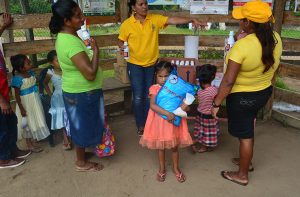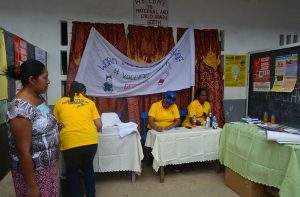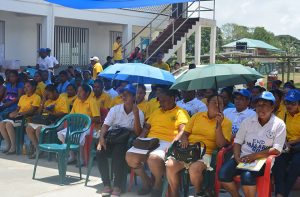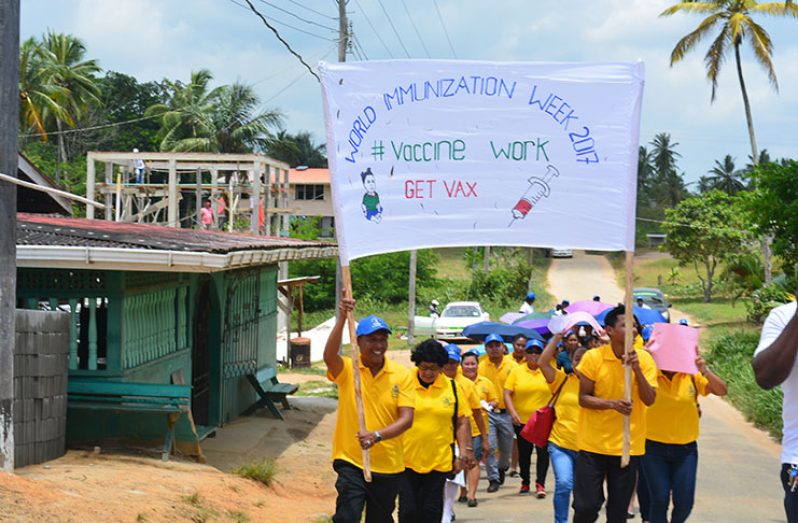RESIDENTS and health practitioners of the Barima-Waini sub-region of Moruca on Saturday were beneficiaries of an informative programme hosted by the Ministry of Public Health in recognition of Vaccination Week in the Americas.
The programme coincided with World Malaria Day 2017 and commenced with a march starting at the Moruca Regional Hospital and ending at the Santa Rosa Secondary School.
Senior officials from the Ministry of Public Health, including staff from the Vector Control Services Department and the Pan American Health Organisation/ World Health Organisation (PAHO/WHO) joined doctors, nurses, medical practitioners, regional officials, students and residents in the lively exercise.

Braving the hot sun, participants clad in their theme jerseys, chant “Get vax to celebrate a healthy tomorrow and end Malaria for Good. Let’s boost prevention,” the themes of both celebrations.
Pamphlets and fliers were also distributed to spectators. At the Santa Rosa Secondary School, a packed programme awaited the participants.
Deputy Chief Medical Officer, Dr Karen Gordon- Boyle, addressing the gathering said the decision to hold the programme in Moruca is in keeping with the ministry’s aim to improve service and awareness in less highlighted areas.
The goal, she said, is to sensitise residents of outlying areas, especially those close to the porous borders, on the importance of vaccines in preventing vaccine- preventable diseases such as malaria.
Being cognisant of the stumbling blocks to timely and effective health-care provisions such as inadequate human resources and poor communication between coastal and hinterland communities, Boyle stressed the need to sensitise communities and strengthening relationships between the residents and health- care providers in these regions and entities, such as the Ministry of Public Health and PAHO/WHO.
“Not only the type of partnership that we have between the Ministry of Public Health and the Ministry of Communities, also partnerships between Government and communities, partnerships between the communities and the private sector,” Dr Boyle said.
Despite these limitations, Dr Boyle said immunisation coverage is 90 per cent.
WORRY
She expressed worry about many home births and communities close to the porous borders, especially where the ports of entry lack health officers,but said
a collaborative effort is needed to address this shortcoming.
She encouraged communities to live in harmony and residents to be their brother’s keeper in trying to keep diseases at bay.
“If a community takes a stand that we are going to ensure we have a clean environment because what affects your neighbour affects you…. We know that health is not just the mere absence of disease, but a state of complete physical, psychological, social and spiritual well-being,” she said
Her sentiments were echoed by Dr Jean Alexandre, Focal Point for Vector-Borne Diseases at PAHO/WHO. He posited that Vaccination Week advances equity and access to vaccinations.
Alexandre pointed out that PAHO has eradicated many diseases over the last 40 years as a result of vaccines.

“Small pox, polio and measles, new vaccines have been introduced to protect against influencers, respiratory illnesses and cervical cancer,” he said.
In Guyana, 17 vaccines were introduced in 1970 to prevent diseases and the programme has expanded from a child immunisation programme to a family immunisation programme.
It is with similar hope that PAHO in collaboration with the MoPH is working assiduously to eradicate malaria by the year 2030.
The PAHO representative affirmed that World Malaria Day is to highlight the need for continuous work to eradicate the disease.
“This year, the WHO wishes to shine a spotlight on prevention, critical strategies for reducing the toll of a disease that continues to claim more than 400, 000 lives a year,”
PREVENTATIVE MEASURES
As the saying goes, ‘prevention is better than cure’, mechanisms are being implemented to reduce the prevalence of the disease.
Currently, the Vector Control Department is on a campaign, distributing insecticide-treated nets which have been proven to be a more effective preventative strategy.
Dr. Alexandre, however, highlighted that progress is relatively slow in countries such as Guyana and made a public call to Government to boost investment in malaria prevention.
Also highlighting the preventative measures was Dr. Quacy Grant, the Malaria Coordinator at the Vector Control Services.
The treated nets, he said, are being distributed free of charge.
“This year, the Ministry of Public Health through Vector Control Services, we are looking to have mass distribution of our treated nets and therefore we will be going to each and every community in Regions One, Seven, Eight and Nine and we will ensure that each resident has a net, our bed nets will be distributed one for every two persons and our hammock nets, one for every one person…. so we are working very closely with the village councils, the toshaos [and] the health care workers to help us in our distribution.”
Grant is also encouraging residents to keep their environments clean, wear light- coloured and well-covered clothing, use repellants and destroy breathing sites.

Regional Health Officer Dr Cerdel McWatt, expressed appreciation for the programme being brought to Moruca, pointing out that residents will be fully sensitised on the critical importance of vaccines and the malaria programme.
He commended the hard-working staff in the sub-region for their inputs and dedication in trying to eradicate vaccine- preventable diseases, but is cognisant that much more is still to be done.
“Our efforts are significant, but our fight is still to continue to realise the grand finale or the success…. our nation’s wealth lies in the health status of our nation,” he said.
Residents received pamphlets and fliers with information on preventing malaria and getting vaccinated.
Malaria tests were also conducted on site. Also present at the event were Regional Executive Officer Leslie Wilburg; Dr Horace Cox, Director of the Vector Control Services; and Chief Inspector of Vector Control Services, David Williams; representatives from the malaria control programme and several other senior medical practitioners.



.jpg)








